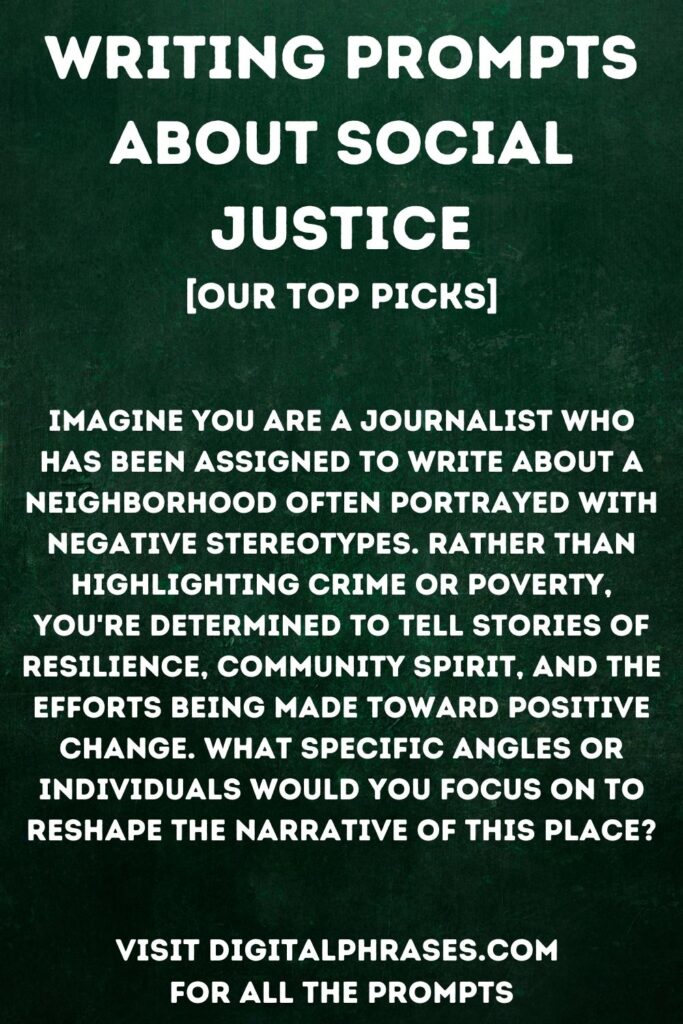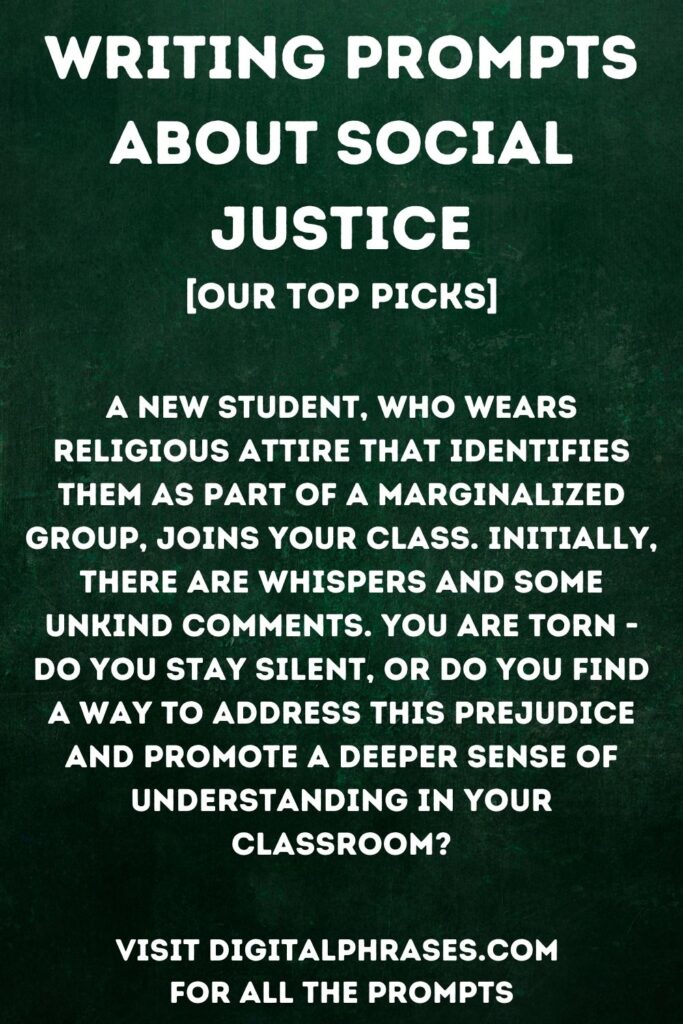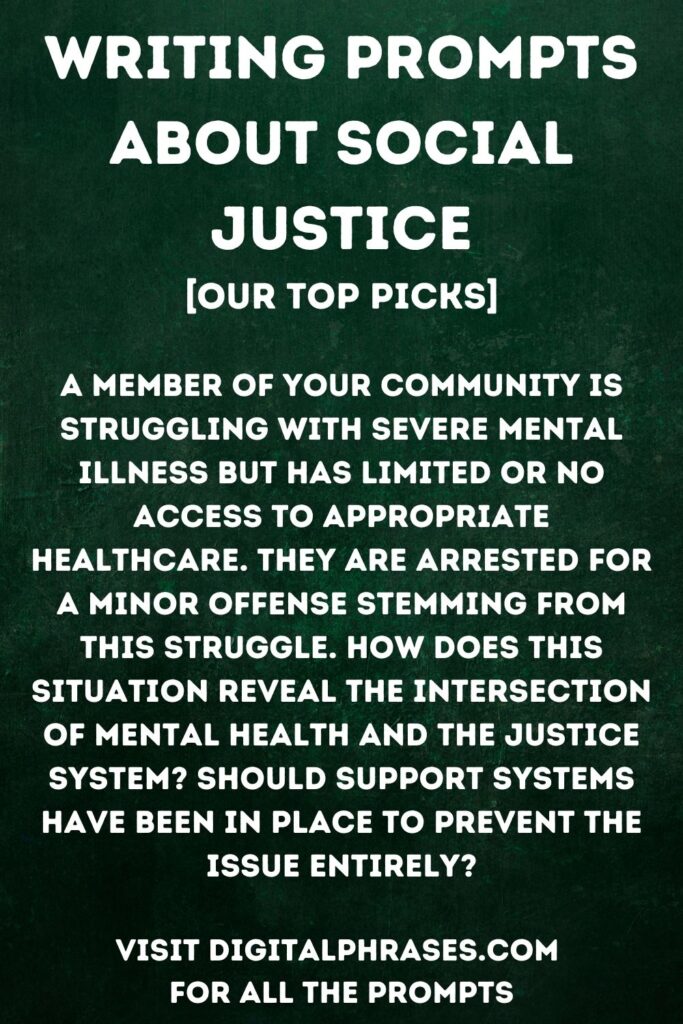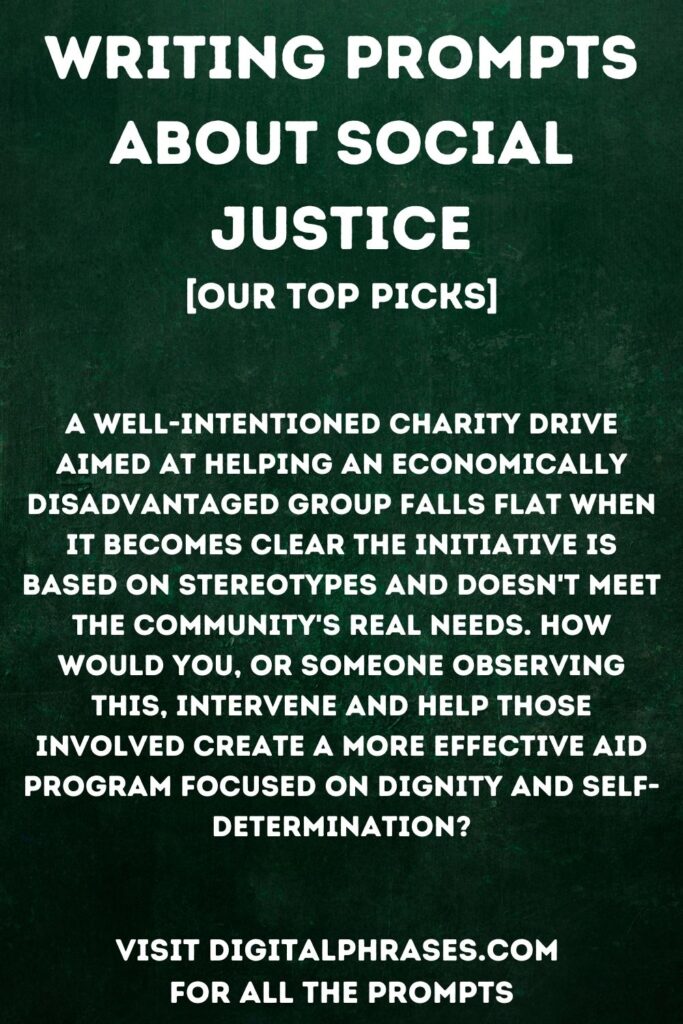25 Writing Prompts About Social Justice
You know how short videos are everywhere these days, but they don’t really tell the whole story, right?
Well, stories – those can really dig in and show you all the sides of an issue, especially when it comes to fighting for what’s fair.
We all have experiences and ideas, and sharing them helps us understand each other better.
But how often do we actually stop and think about fairness, who gets the good stuff, and how we can make things more equal?
Reading and writing about these things can really challenge the way we see the world, you know, break some of those assumptions we might not even realize we have.
So, buckle up!
We’re gonna be exploring a bunch of writing prompts themed around the very concept of social justice. Let’s get those conversations flowing, write stories that make you think, and maybe even inspire some real change.
Let’s dive in, get real, and use our words to build a world that’s fair for everyone!
Writing Prompts about Social Justice
Imagine you are a journalist who has been assigned to write about a neighborhood often portrayed with negative stereotypes. Rather than highlighting crime or poverty, you’re determined to tell stories of resilience, community spirit, and the efforts being made toward positive change. What specific angles or individuals would you focus on to reshape the narrative of this place?
A new student, who wears religious attire that identifies them as part of a marginalized group, joins your class. Initially, there are whispers and some unkind comments. You are torn – do you stay silent, or do you find a way to address this prejudice and promote a deeper sense of understanding in your classroom?
One day, a homeless person seeking shelter enters the public library where you work. You observe as some patrons react with disgust, while others try to help. How do the library’s policies address the needs of the homeless? Are they fair and humane, or do they raise ethical dilemmas for the community?
You discover that a favorite clothing brand of yours is rumored to use factories with questionable labor practices in other countries. Do you continue to patronize the store, or do you try to learn more about the situation? What does it mean to be a conscious consumer in a world of global trade?
A protest is being organized in your town over an issue of systemic injustice. You’re not sure about joining the demonstration itself, but you do have creative skills. Choose a medium (e.g., art, music, writing) and explore ways you can use it to support the cause and draw attention to the issue.

Your family has old photo albums or documents that reveal an uncomfortable truth – an ancestor was involved in actions we would now consider deeply prejudiced. How does this knowledge come to light, and how do the members of your family react? Does it change how you view your family history or even your own identity?
A close friend or relative starts expressing viewpoints that you find discriminatory or offensive. Their comments put a strain on your relationship. How do you navigate this? Do you speak up even if it risks damaging the connection, or do you grapple with the internal conflict in silence?
Imagine a world where a significant social injustice has been largely eradicated (you choose the issue). What factors, movements, and changes would have led to this progress? How is day-to-day life different for people in this future world?
A member of your community is struggling with severe mental illness but has limited or no access to appropriate healthcare. They are arrested for a minor offense stemming from this struggle. How does this situation reveal the intersection of mental health and the justice system? Should support systems have been in place to prevent the issue entirely?
Think about a specific instance in history where one person’s actions sparked significant progress on a social justice issue (this can be a famous figure or someone from your local community). What motivated this person? What obstacles did they face, and how did they overcome them?

A well-intentioned charity drive aimed at helping an economically disadvantaged group falls flat when it becomes clear the initiative is based on stereotypes and doesn’t meet the community’s real needs. How would you, or someone observing this, intervene and help those involved create a more effective aid program focused on dignity and self-determination?
Imagine you are working on the design for a public space (a park, community center, etc.). What features would you incorporate to make the space truly accessible and welcoming for individuals with a wide range of physical and cognitive disabilities? How can accessibility be woven into design from the very beginning?
Many dress codes and school policies, while seemingly neutral, indirectly target marginalized groups. Think about a specific rule at your school/former school. Is it fair and necessary, or does it unfairly impact certain students? How could it be revised to be more inclusive?
A polluting factory is being proposed for construction on the outskirts of your town, in an area where lower-income families live. What health risks might this pose for residents, and are the economic benefits worth the costs? Explore the concept of environmental racism and how communities can fight back.
You are working with a group of younger children on a social justice project. Their initial ideas seem to center around easily visible differences like race and physical ability. How would you gently guide them into understanding more complex forms of inequality and privilege?

In the not-too-distant future, technology has changed how protests and activism happen. Perhaps physical gatherings are more limited, or maybe AI and virtual reality tools play a role. How could a protest be organized in this future setting, and what unique opportunities and challenges might it present?
You discover that the search engine results you get online are subtly tailored to reflect assumptions about you based on your location, browsing history, and other data. It seems to reinforce stereotypes and sometimes even limits your exposure to diverse viewpoints on social issues. How would you work to combat this bias and promote a more neutral search experience?
You’re having a conversation with an older relative (grandparent, aunt/uncle, etc.) who expresses views that you feel are outdated on a social justice topic. They seem to think things were better in the past. How do you approach this discussion? Can you find common ground or help bridge the generational gap?
Choose a current social justice issue that you care deeply about. Imagine creating a piece of art (visual, musical, performance, etc.) that could raise awareness or provoke thought about the topic. What symbols, imagery, or techniques would you use to make it powerful?
A debate arises in your community over animal rights, perhaps about factory farming, testing on animals, or a related issue. Explore the complex arguments from both sides of the debate. Is there a compromise to be made, or is this a case where one side has a clear moral advantage?

You notice a subtle pattern of microaggressions at your school or workplace. These small comments and behaviors are often unintentional but reflect harmful underlying biases. How do you speak up, either to the person committing them or to someone with more authority to address a systemic pattern?
The curriculum in your history class centers on the dominant culture’s perspective, downplaying or excluding the struggles and contributions of marginalized groups. You decide to do research for personal enrichment and to share with the class. What stories do you uncover, and how can these be incorporated into a more inclusive history lesson?
A large corporation wants to open a new facility in your town. This would bring jobs but also raises possible environmental concerns and threatens to displace small businesses. How would you research this situation to weigh the potential benefits against the risks? What role does a community play in influencing such a decision?
Imagine participating in a “privilege walk” exercise, where individuals take steps forward or backward based on statements about unearned advantages or disadvantages. How would this experience impact your understanding of your own position in society? What reflections would you have after the exercise?
You become aware of how commonly used phrases and words may be insensitive or carry harmful connotations related to race, ability, gender identity, or other aspects of identity. How would you shift your own vocabulary to be more inclusive? Is it worth trying to educate others as well?

